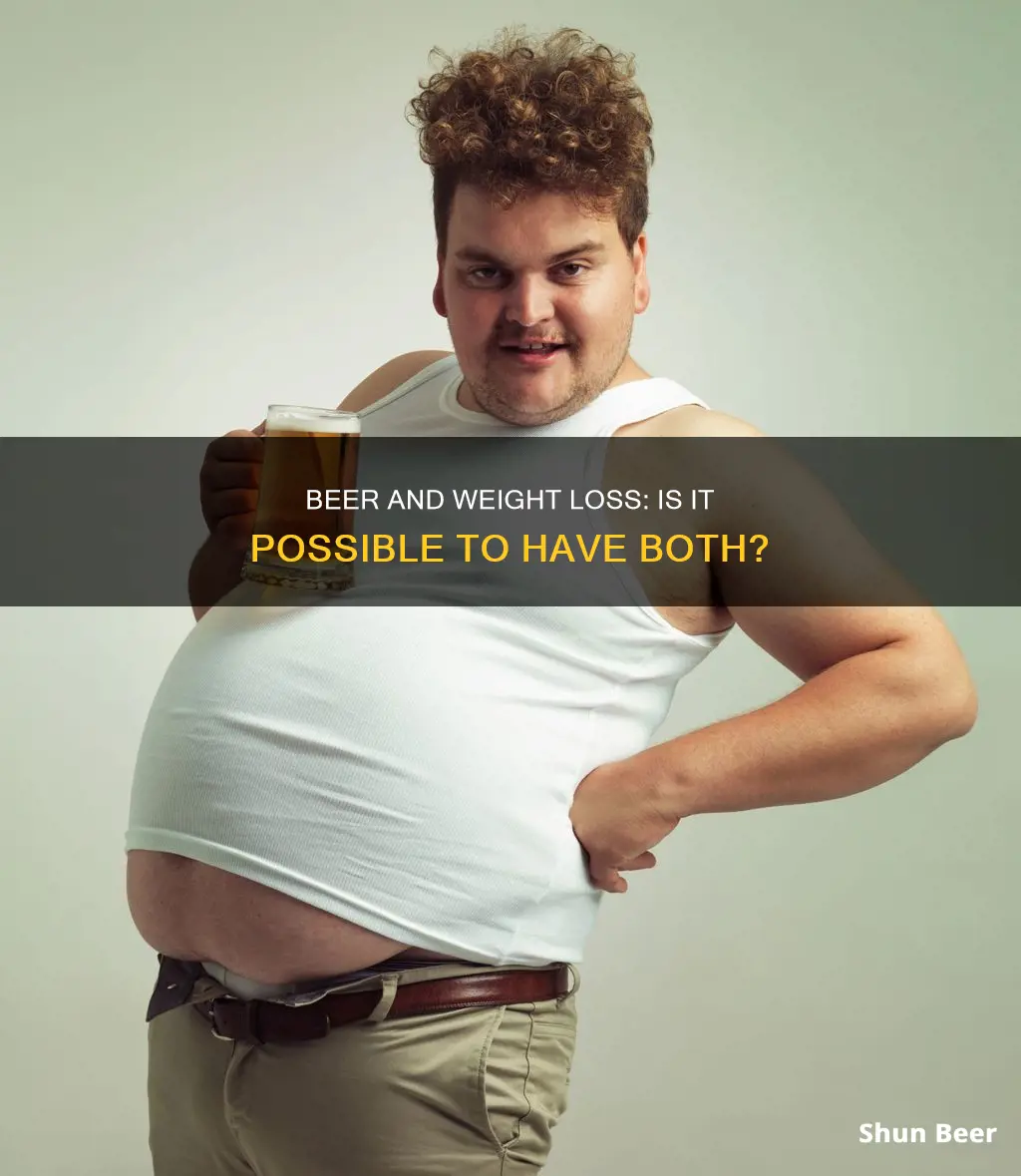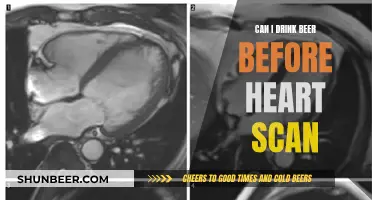
Beer and weight loss are not mutually exclusive, but it is challenging to manage both together. Beer can contribute a lot of calories, and it is difficult to determine which beers are high or low in calories as this information is not always readily available. Alcohol also reduces inhibitions and stimulates your appetite, which can lead to increased food consumption and subsequent weight gain. However, drinking beer in moderation and being mindful of calorie intake can help in achieving weight loss goals. Switching to light beers or low-calorie options and staying hydrated while drinking can aid in reducing caloric intake. Ultimately, it is about finding a healthy balance to ensure your body burns fat for fuel.
| Characteristics | Values |
|---|---|
| Calories | Beer is high in calories, with regular beer containing around 150 calories per 12-ounce glass. Craft beers can contain even more calories, with some topping 200. |
| Weight Gain | Drinking beer is associated with weight gain and obesity. |
| Metabolism | Alcohol may impact metabolism, causing weight gain. |
| Appetite | Alcohol can increase appetite and enhance the pleasure of eating, leading to increased food consumption. |
| Sleep | Alcohol can disrupt sleep patterns, which can impact metabolism and increase the risk of weight gain. |
| Nutrition | Beer contains few nutrients, providing "empty calories." |
| Fat Oxidation | Alcohol may impact fat oxidation, leading to higher body fat levels. |
| Portion Size | Reducing portion size, such as choosing a smaller glass or a 12-ounce can, can help manage calorie intake. |
| Frequency | Drinking less frequently, such as only on weekends, can aid weight loss. |
| Low-Calorie Options | Choosing lower-calorie beers, such as light beers or low-ABV options, can help reduce calorie intake. |
| Mindful Drinking | Practicing mindful drinking, such as tracking alcohol consumption and staying hydrated, can aid weight loss. |
What You'll Learn

Beer and weight loss: calories and content
Beer is a popular alcoholic drink, but how does it impact weight loss? It is important to understand the relationship between beer, calories, and weight management to make informed choices.
Calories in Beer
Beer contributes a significant amount of calories, which can be a challenge for individuals trying to lose weight. The calorie content of beer varies, with regular beer containing around 150 calories per 12-ounce glass, while craft beers can have even higher calorie counts, sometimes exceeding 200 calories. The alcohol content, expressed as a percentage of alcohol by volume (% ABV), is a key factor influencing the calorie content. The higher the ABV, the higher the calories.
Impact on Weight Loss
The high calorie content of beer can hinder weight loss efforts. When trying to lose weight, creating a caloric deficit is crucial, and drinking beer can make it more difficult to achieve this deficit. However, it is important to note that beer can be included in a weight loss plan with some adjustments.
Strategies for Drinking Beer While Losing Weight
- Opt for light or low % ABV beers: These beers have a lower calorie content, helping to reduce overall calorie intake.
- Reduce portion sizes: Use smaller glasses or choose cans instead of bottles to control the amount you drink.
- Drink less frequently: Limit beer consumption to weekends or special occasions.
- Choose lower-carb beers: Beers like Michelob Ultra, Budweiser Select 55, and Corona Premier have lower carbohydrate content, which can support weight loss.
- Drink in moderation: Health experts recommend no more than 1-2 drinks per day for men and no more than 1 drink per day for women.
- Plan and track your drinks: Be mindful of the number and type of drinks you consume, and include them in your daily calorie count.
- Alternate with water: Drinking water between beers helps with hydration and can reduce the total number of beers consumed.
- Eat before drinking: Having a healthy meal before drinking can slow the absorption of alcohol and help make better food choices.
- Choose healthier snacks: Opt for low-calorie, high-protein, and high-fat snacks to reduce excess calorie intake.
Beer and Metabolism
In addition to its calorie content, beer can also impact metabolism. Alcohol provides a quicker, more accessible form of energy for the body compared to fat. As a result, the body prioritizes burning alcohol over fat, which can slow down weight loss.
Beer and Appetite
Beer and alcohol, in general, can enhance appetite and increase cravings for high-fat, savory foods. This can lead to consuming more calories and negatively impact weight loss efforts.
While beer can be a part of a weight loss journey, it is important to approach it with moderation and mindfulness. By understanding the calorie content, adjusting drinking habits, and making informed choices, individuals can enjoy beer while still working towards their weight loss goals.
Beer and Milkshakes: Mixing Drinks, Safe or Not?
You may want to see also

Alcohol mixers and weight loss
Mindful Drinking and Moderation:
Moderation is key when it comes to drinking alcohol and maintaining a healthy weight. Health experts recommend drinking in moderation, which means no more than one drink per day for women and no more than two drinks per day for men. If you're trying to lose weight, you may want to drink less than that. Keep in mind that alcohol contains empty calories, providing energy without essential nutrients.
Calories in Alcohol and Mixers:
When trying to lose weight, pay attention to the calories in both the alcohol and the mixers you choose. A piña colada, for example, can contain over 400 calories. Even a classic margarita can have around 200-300 calories. The mixers in these drinks are often loaded with sugar and extra calories. Opt for lower-calorie mixers like soda water, sugar-free tonic water, or club soda.
Hydration is Key:
Staying hydrated while drinking alcohol is essential. Alcohol is a diuretic, which means it dehydrates you. Drinking water before, during, and after consuming alcohol can help reduce the risk of dehydration and related hangover symptoms. Alternating alcoholic drinks with water can also help you pace yourself and reduce your overall alcohol consumption.
Food Choices Matter:
Drinking alcohol can impact your appetite and food choices. Studies show that alcohol can enhance your appetite and increase your cravings for high-fat, savory foods. It can also affect your judgment, leading to poorer food choices. If you know you'll be drinking, plan ahead and prepare low-calorie, nutritious snacks or meals. Eating a healthy dinner with lean protein and good fats before drinking can help slow the absorption of alcohol and keep your food choices on track.
Burn Calories Through Exercise:
To lose weight, you need to burn more calories than you consume. If you want to include alcohol in your diet, consider increasing your exercise regimen to create a calorie deficit. High-intensity interval training (HIIT) and heavy resistance training can boost your metabolism and increase your body's ability to burn calories, even at rest.
In conclusion, while alcohol mixers and weight loss can coexist, it requires mindfulness, moderation, and a holistic approach to your health and lifestyle.
Gun Owners and Alcohol: Drinking and Carrying a Firearm
You may want to see also

Drinking beer and losing weight: diet and exercise
It is possible to lose weight and still drink beer, but it requires a mindful approach to drinking and a commitment to a healthy diet and exercise regime.
Calories in beer
Beer can be high in calories, and it is often difficult to determine which beers are low or high-calorie, as this information is not always provided on the container. A regular beer is typically around 150 calories for a 12-ounce glass, while a craft beer can be upwards of 170 calories. Light beers are a better option, with around 100 calories per 12-ounce glass.
Alcohol and weight gain
Alcohol is a well-known contributor to weight gain, and studies have shown that heavy drinking and binge drinking are associated with an increased risk of obesity. Alcohol is high in calories and often mixed with sugary drinks or consumed with calorie-rich food, leading to excess energy that the body stores as fat. Alcohol also reduces inhibitions and stimulates the appetite, leading to increased food consumption.
Strategies for drinking beer while losing weight
- Drink in moderation: Limit the number of drinks you consume and have a drink limit in mind before you go out.
- Choose lower-calorie options: Opt for light beers or low-ABV beers, which have fewer calories and carbohydrates.
- Stay hydrated: Alternate alcoholic drinks with glasses of water to stay hydrated and reduce the number of beers consumed.
- Eat before drinking: Eating a healthy meal before drinking can slow the absorption of alcohol and help you make better food choices.
- Exercise: Engage in physical activity, such as High-Intensity Interval Training (HIIT) or heavy resistance training, to increase your metabolism and burn more calories.
- Cut calories: Reduce your overall calorie intake by making low-calorie food choices and avoiding high-calorie mixers.
Benadryl and Beer: A Safe Mix?
You may want to see also

Alcohol's impact on sleep and weight loss
Alcohol can impact your sleep and your weight loss efforts in several ways. Firstly, alcohol is a diuretic, which means it dehydrates you and can disrupt your sleep. Even if you fall asleep quickly, you are more likely to wake up in the middle of the night or early in the morning due to alcohol's sedative effects wearing off. Poor sleep can then negatively affect your metabolism and hormones, increasing your chances of weight gain.
Secondly, alcohol is a source of empty calories. While the number of calories varies depending on the type of drink, alcohol provides calories without any nutritional benefits. For example, a regular beer contains about 150 calories, while a craft beer can have 170 to 350 calories. These extra calories can hinder your weight loss goals, especially when combined with the high-calorie mixers and bar food often consumed with alcohol.
Thirdly, alcohol can affect your appetite and food choices. Studies have shown that alcohol enhances appetite and increases the pleasure of eating, particularly high-fat, savory foods. This can lead to increased calorie consumption and poor food choices that do not align with your weight loss goals.
Finally, alcohol changes the way your body burns fat. Your body prioritizes burning alcohol over other nutrients, which can create a metabolic environment that inhibits fat burning. This means that even if you are eating a healthy diet and exercising, alcohol can slow down your weight loss progress.
So, while it is possible to lose weight while still drinking alcohol, it is important to practice mindful drinking. This includes tracking your alcohol consumption, staying hydrated, filling up on nutritious food before drinking, opting for lower-calorie drink options, and drinking in moderation. By being mindful of alcohol's impact on your sleep and weight loss, you can make informed choices that support your overall health and wellness goals.
Beer and Augmentin: Safe Mix?
You may want to see also

Alcohol's effect on appetite and weight loss
Alcohol can affect weight loss in several ways. Firstly, it is calorific, with a high enough consumption leading to weight gain. Secondly, it can lead to poor food choices. Thirdly, it can negatively impact sleep quality, which in turn can affect metabolism and hormone levels. Fourthly, it can increase your appetite and cravings for high-fat, savoury foods. Finally, alcohol changes how your body burns fat, with your body prioritising burning alcohol over other nutrients.
Calorific Content
Alcohol is high in calories. A regular beer contains about 150 calories for a 12-ounce (355 mL) glass, while a light beer contains about 100 calories for the same serving. A higher alcohol or craft beer can contain 170 to 350 calories. These calories are often referred to as "empty calories", as they provide no nutritional value. Mixed drinks can be even more calorific, with a pina colada containing 380 calories in a 7-ounce (207 mL) glass.
Poor Food Choices
Studies have shown that people tend to make poor food choices when drinking alcohol. Alcohol reduces inhibitions, making it more likely that you will snack or eat more than you usually would.
Sleep Quality
Alcohol can negatively impact sleep quality, leading to a higher chance of weight gain. Poor sleep can affect your body's response to glucose, reduce insulin sensitivity, and increase cortisol (the stress hormone) levels.
Appetite and Cravings
Alcohol can enhance your appetite and increase your pleasure in eating a meal. It has been shown to increase cravings for high-fat, savoury foods by 24%. This may be due to a learned effect, as having savoury foods with alcohol is common in Western cultures.
Fat Burning
When you drink alcohol, your body prioritises burning it over other nutrients. This can lead to fat-sparing and higher body fat in the long run, as your body may reduce how much lipids and carbs it burns.
Expired Beer: Is It Safe to Drink After Three Years?
You may want to see also







